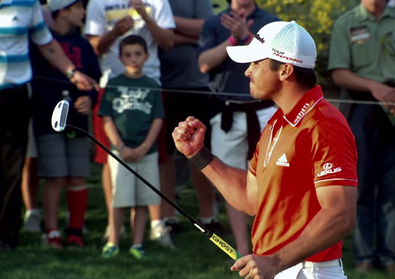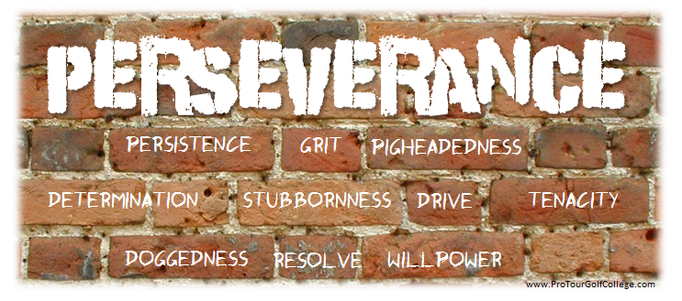|
Well we’ve come to the final article in our 4 part series for high school and college golfers, and this is the last of our golf success factors which will put all other factors we’ve shared into perspective for you. Over the past few weeks we have discussed at length the importance of developing the following characteristics to give you the best chance possible of becoming a successful professional golfer;
But before we get to it, let me share with you a powerful and true story to set the stage.  Justin Peters exemplifies the mental toughness and grit you need Justin Peters exemplifies the mental toughness and grit you need The Tour Golfer Who Won't Give Up Imagine that you are 21 years old and fresh out of college and you have your heart set on going to PGA Tour qualifying school because like many young golfers you have dreamed of one day playing for pay on the big stage with the world’s best. And like many golfers before you with a similar motivation, you decide to enter qualifying school and go through the rigorous qualifying process to attempt to earn your card to play on the PGA Tour. And just like many golfers before you, you don’t get through the qualifying process to final stage. No big deal though, as many tell you that it’s doubtful that you gain your card in your first or even your second attempt. You know you are a good enough player and you feel that it’s only a matter of time before you earn your card to play on a major tour. So you decide to play on the pay to play mini tours to gain the valuable tournament experience that you need, and you achieve quite a bit of early success. Infact you even win the inaugural reality show The Big Break on the The Golf Channel, so your future in golf looks bright for you. You go back to tour school again confident in the knowledge that you can get through, but again you fail to get to the final stage and the chance to earn your tour card.  Picture source: www.minorleaguegolf.com Picture source: www.minorleaguegolf.com Undeterred, you spend more time playing various mini tours and you start to play some excellent golf, you start to contend more often in mini tour events, and you also win some of them. Tour school rolls around once again and you enter more confident in the knowledge that you can get through this time, but once again you fail to make it to last stage. Now this process goes on one year after another and finally after 10 years of trying to qualify, you finally get through to final stage, and then you play well enough to secure your card to play on the Web.Com Tour. Finally you are now off and running. Now you have your chance to get your ticket to the PGA Tour. You just need to play well enough over a season on the Web.Com Tour. You play in 23 Web.Com tournaments and you make the cut in 15, pretty good for your first year out, and you earn just shy of 72,000 dollars for the season, but its not good enough to get your ticket to the PGA Tour. You are reasonably happy with your effort, but you know that you will have to do a lot better the next season if you want to get onto to the PGA Tour. But you don’t. You play in 11 Web.Com tournaments the following season and you make just one cut, so its back to the mini tours for you. Disappointed but not deterred, you keep developing your skills with the help of your instructor to lower your score average, and also get your game ready for another crack at tour school when it comes around. The time arrives and you enter tour school again, and yet once more you fail to get to final stage, and the chance to gain your card, so you go back to the mini tours, and also enter the Monday qualifiers to try to get back onto the Web.Com tour.  Now all the way along this journey your golf scores have been getting better, you are scoring lower more often, and you are winning more mini tour events, predominantly on the GOLFSlinger.com tour. You also successfully pre-qualify a number of times through Monday qualifying tournaments to play some Web.Com and PGA Tour events. Finally you have some hard earned success by qualifying to play on the PGA Tour of Canada, but yet again you face another setback as you play 11 tournaments on that tour, but make the cut in just 5 events and you earn fewer than 4,000 dollars for your effort. Now at this stage it would be easy to listen to all of the detractors and critics sitting on the sidelines telling you to give up on your dream, and to go get a real job. But you simply will not entertain the thought of giving up on your dream because you know that deep down inside that you are good enough, and you know that your time will come. Tour school comes around again and history up to this point of time shows that you are now 37 years old, and you have been to PGA Tour and Web.Com Tour Qualifying School a total of 16 times, and up to this point of time you’ve made it to final stage just once. But you have one thing going for you that many of the younger inexperienced competitors don’t, you have loads of professional tournament experience, and tons of determination. You play well through the qualifying stages and you finally make it to the final stage of tour school, and you are reminded that is only the second time in your career that you have achieved this feat. But you are confident, calm, focused and very experienced, and so you set your sights boldly on a top 10 finish in the final stage. After five rounds you sit at 10 under par and tied for 18th going into the final round, and you know that it would be easy to get ahead of yourself and imagine yourself with a card to play on the Web.Com Tour. But you won’t fall for this type of thinking because you recognize from all your experience that the key to success when in this position is to stick to your process and just play each shot based on its merit. And that’s just what you do, and after 16 attempts and only two times making it to final stage you earn the right to play once again on the Web.Com Tour in 2015, shooting a final round of 3 under par 68 to finish in a tie for 11th place, just outside your top 10 target, but a fantastic effort just the same. After thousands of golf shots played at golf courses all over the country, many thousands of dollars spent on the qualifying process, and thousands of hours of practice you make it back to the Web.Com Tour and get another chance to get to the PGA Tour. Justin Peters proved at the 2014 Web.Com Tour School that with loads of grit, determination, skill and experience you can achieve goals that seem out of reach or unconquerable. Keep in mind that there are many fine golfers just like Justin Peters playing the mini tours who are trying to play well enough to make it the PGA Tour. Justin just keeps finding ways to keep turning up to play. Here's a link to Justin's blog to find out more about him and his fascinating career. (Click Here) Want to Know More About Life on the Mini Tours? Read this Informative Article Titled "The Harsh Realities of Golf's Mini Tours"... Click this Link  Mini and major tour golfers are tough and extremely determined individuals Mini and major tour golfers are tough and extremely determined individuals Golf Success Factor 4. Just Keep Turning Up to Play Justin Peters exemplifies the type of character you need to become to become a successful professional golfer. You simply have to have a ton of determination to keep turning up to play golf at the pro level, and to ultimately succeed at it. Very few young golfers get straight to the main tour and achieve the level of success that Jordan Spieth or Lydia Ko have so early in their careers. For most, you will have to play in the smaller lower tier tournaments gaining valuable tournament experience to develop your self-belief and confidence, and you must keep developing your high pay-off golf skills. To keep turning up to play tournaments you have to have at least one clearly defined goal. Justin Peters wanted to get onto the Web.Com Tour first and foremost, and then play well enough to get to the PGA Tour. He has a big reason to keep him moving forwards with his game, even with lots of setbacks. And you will as well. Very few high school and college golfers we have observed have the amount of grit and determination that Justin Peters displays, but you can develop some. So what are the lessons you can take away from this story to help you to develop your grit and determination so you can keep turning up to play? 1. Turn Failure Into a Lesson You will have many set-backs along the way, no golfer is exempt from them. You need to develop the mind-set that failure is simply feedback and that something in your game is deficient and needs more work to achieve better outcomes. After facing a set-back take the time to define the specific area of your game that most likely influenced the result you achieved, and do something about it. 2. Get Over it and Get On With it Justin Peters had lots of set-backs but he kept moving forward. When you have a set-back it is very easy to stew over it, but this gets you nowhere. You need to develop your positive self-talk so you can manage the negative thoughts and voices that can fill your mind with doubt. Talk about what you will do, NOT what you will avoid doing. Focus on positive thoughts of successfully achieving your outcomes, and let the words that come from your mouth always be supportive of your efforts. Lastly avoid hanging around negative golfers. 3. Break the Journey Up into Small Steps The key to making progress in golf is to have lots of small specific goals that help you get through each day. If your big goal is to make it onto a professional tour, then everyday focus on mastering the skills, and the behaviors that will help you to achieve this. Become great at isolating each skill process and practice it with the attitude that it is the only thing that matters to you. This will teach you to stay focused on the process of improvement, and to not get ahead of yourself or reflect on past poor efforts. Last Thoughts Every high school and college golfer that achieved their goal of making it to a major golf tour was once where you are now. Most won't make it, but then again, most won't keep finding ways to improve. And that is the key to your golf success; never stop finding ways to improve yourself and your game, and just keep turning up to play. Because if you just keep knocking at the door of success for long enough, one day it will open for you. Lawrie Montague and David Milne - Pro Tour Golf College Your Success On Tour is Our Business Join our next semester at Pro Tour Golf College and we will train
|
Archives
June 2019
|
Proudly Supported By
Copyright © 2011 - 2018 Pro Tour Golf College
Website Managed By Golf Performance Media
All Rights Reserved
Website Managed By Golf Performance Media
All Rights Reserved




 RSS Feed
RSS Feed



